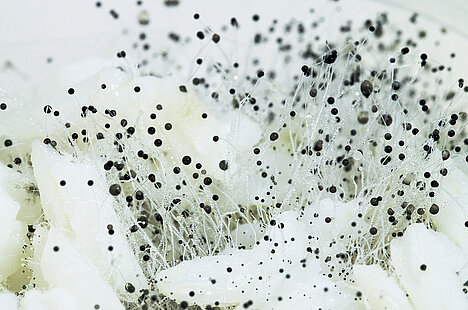Rhizopus oryzae

Rhizopus oryzae is a mold that is widespread in nature. It occurs as a saprophyte in soil, manure and rotting plant material. It is also an important component of some fermented foods, such as tempeh or sake. But what does this fungus have to do with dogs? Is it harmful or beneficial for them? In this article you will learn more about Rhizopus oryzae and its effect on dogs.
What is Rhizopus oryzae?
Rhizopus oryzae is a filamentous fungus that belongs to the yoke fungi. It forms spores in spherical sporangia, which sit at the tip of sporangia carriers. The sporangia grow from stolons, which branch out and form root-like structures, the rhizoids. The fungus grows very quickly and forms a cotton-like texture that starts out white and later turns gray to brown.
Rhizopus oryzae is very similar to Rhizopus stolonifer, the common bread mold, which is often found on bread or fruit. However, it can be distinguished from it by its smaller sporangia and air-dispersed spores. It can also be distinguished from other Rhizopus species by its larger columella (the inner structures of the sporangia) and spores.
Rhizopus oryzae can grow at temperatures from 7 °C to 44 °C, with the optimum temperature being 37 °C. It prefers slightly acidic media and can grow well in media with 1% NaCl, but not in media with 5% NaCl.
What are the advantages of Rhizopus oryzae?
Rhizopus oryzae has many biotechnological applications as it produces a variety of enzymes that can break down carbohydrates and synthesize polymers. It can also produce organic acids, ethanol and esters that give it useful properties in the food industry, biodiesel production and the pharmaceutical industry.
An example of a fermented food produced with Rhizopus oryzae is tempeh, a traditional Indonesian food made from soybeans. Tempeh has a nutty flavor and firm texture and is rich in protein, fiber and vitamins. Tempeh can also be healthy for dogs as it is easy to digest and can boost the immune system.
Another example of a fermented food made with Rhizopus oryzae is sake, a Japanese alcoholic drink made from rice. Sake has a mild flavor and an alcohol content of about 15%. Sake can also be healthy for dogs when given in small amounts, as it has antioxidant properties and can promote blood circulation.
What are the disadvantages of Rhizopus oryzae?
Rhizopus oryzae is not only a beneficial fungus, but also a potential pathogen for humans and animals. It can cause severe fungal infections, known as zygomycoses, in people with weakened immune systems. These infections can affect various organs, such as the sinuses, lungs, skin or brain.
Dogs can also be infected by Rhizopus oryzae, especially if they have open wounds or suffer from diabetes. Symptoms of zygomycosis in dogs can include fever, loss of appetite, weight loss, nasal discharge, respiratory distress, skin ulcers or neurological disorders. Diagnosis of zygomycosis in dogs requires microscopic examination or culture of the affected tissue. Treatment of zygomycosis in dogs requires aggressive surgical removal of the infected tissue and long-term antifungal therapy.
How to avoid Rhizopus oryzae?
To avoid Rhizopus oryzae infection, you should take some precautions, such as:
- Avoid giving your dog moldy foods, especially bread or fruit.
- Keep fermented foods made with Rhizopus oryzae, such as tempeh or sake, in the refrigerator and consume them within the expiration date.
- Keep your dog's wounds clean and dry and see a vet if they become infected or fester.
- Check your dog's blood sugar levels regularly if he has diabetes and give him the appropriate medication.
- Clean and ventilate your home regularly to prevent mold growth.
Rhizopus oryzae is a mold that can have both advantages and disadvantages for dogs. It can produce useful enzymes and substances that are used in the food industry, biodiesel production and the pharmaceutical industry. It can also produce fermented foods that can be healthy for dogs, such as tempeh or sake. However, it can also cause serious fungal infections known as zygomycoses, which can affect various organs. To avoid infection with Rhizopus oryzae, avoid moldy foods, keep fermented foods cool, keep wounds clean, control diabetes and prevent mold growth.
If you notice any signs of hypersensitivity or poisoning in your dog, you should see your vet immediately. We are not a substitute for a vet, but we try to be as accurate as possible. Every dog reacts differently and we recommend you get a second opinion or consult your vet if in doubt.
Stay healthy and take good care of your four-legged friend!😊